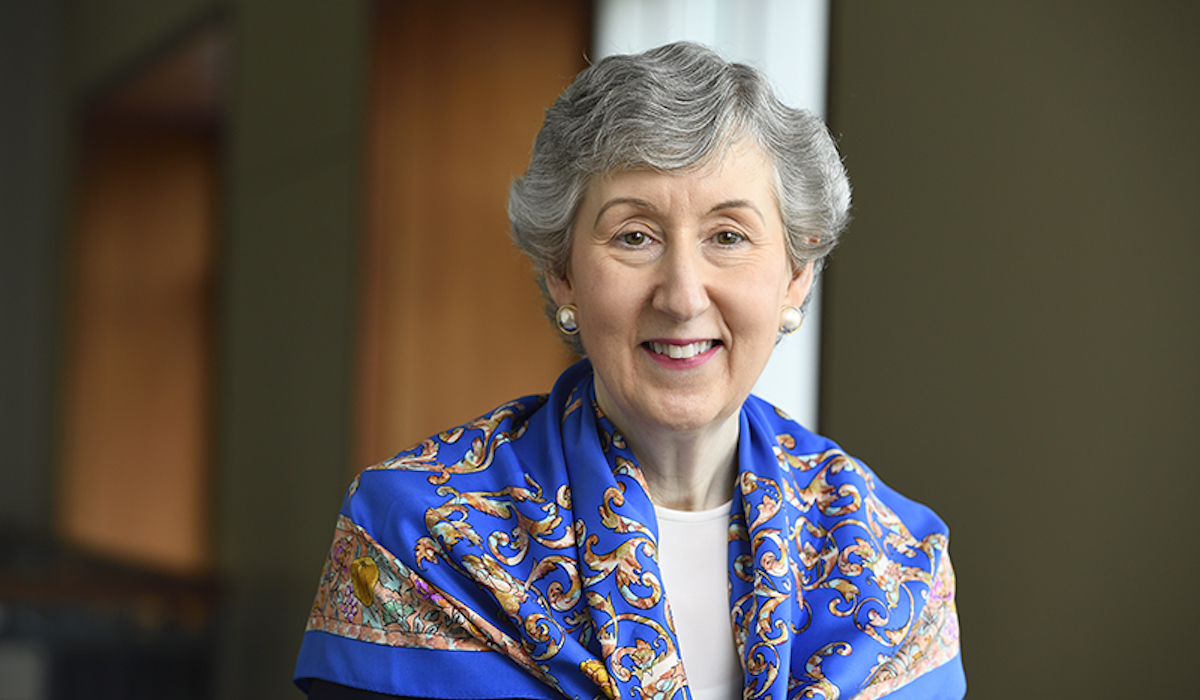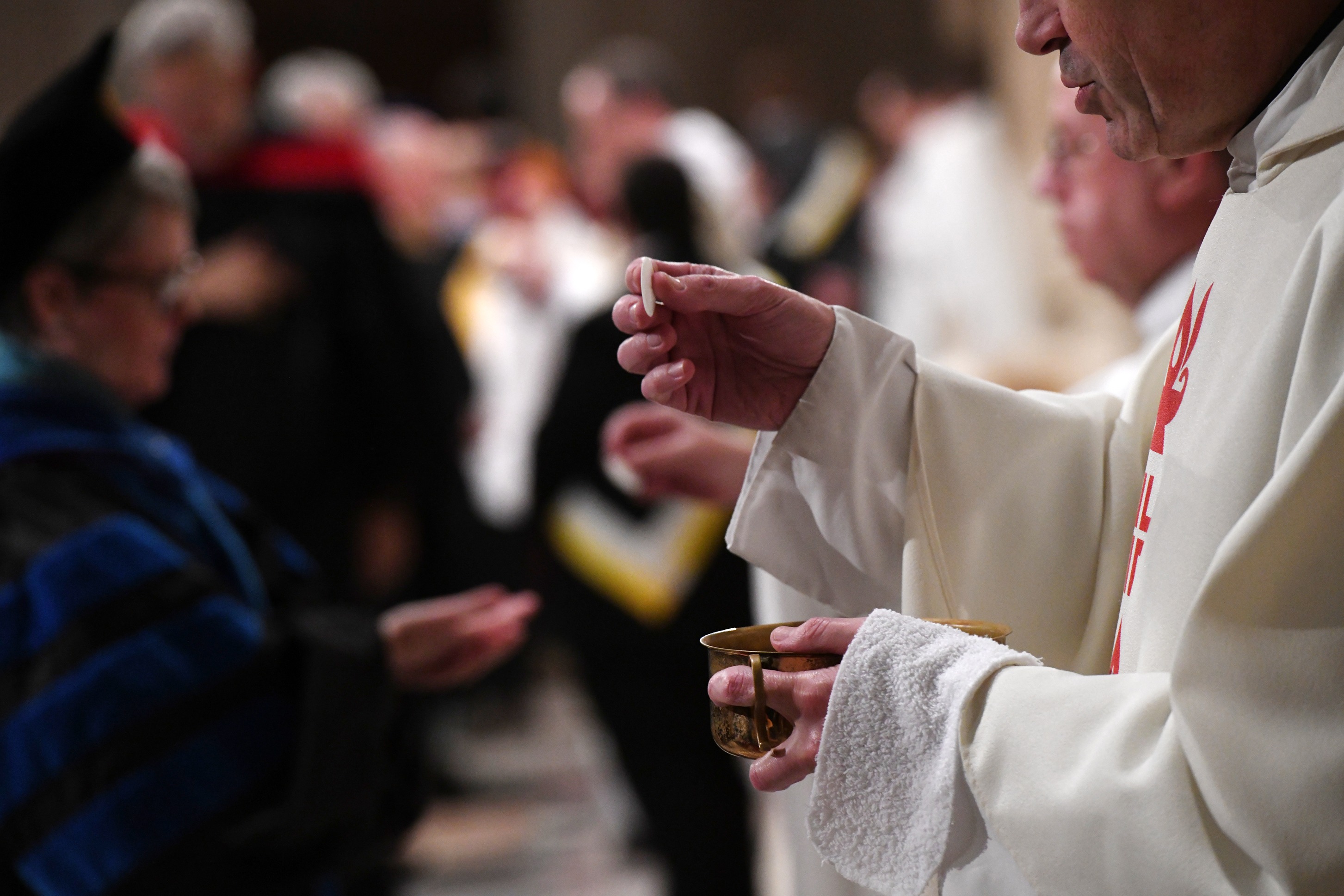I was deeply honored to be invited to talk to the very distinguished members of the John Carroll Society about The Catholic University of America Conway School of Nursing.
I decided to talk about the virtues, particularly courage and compassion because people often think about nurses as gentle and compassionate but less frequently perhaps as courageous. And when I proposed the title, “courage and compassion, two sides of the same nurse”, Msgr. Vaghi suggested adding “and each of us” because courage and compassion are important for everyone and are an especially important aspect of our life as Catholics.
I appreciate Monsignor Vaghi’s reminder that virtue is important for all of us because it is easy to become too focused on one’s own discipline and world. A little more than a year ago when I was a new dean at Catholic University and President Kilpatrick who is not only an experienced academic leader, but also an engineer arrived just a couple of months after I did. When I met him I said something like, “I am the new dean of nursing and I know that the school of nursing is the school that most clearly lives out our Catholic mission because we see nursing as advancing the healing ministry of Jesus Christ.”
President Kilpatrick paused a moment and then said “Yes! And, the School of Engineering.” At that moment I did not realize how engineers could advance the ministry of Jesus Christ but later I learned that our engineering faculty teach students amazing things like how to create or enhance prosthetic devices so that physically disabled individuals can live full and active lives.
And like the Conway School of Nursing, the School of Engineering focuses on educating the whole student; mind body and spirit. So, I conceded that the school of nursing AND the school of engineering were producing good virtuous graduates. I soon also learned how the Busch School of Business helps a student to find the meaning of his/her life and how to use that life to serve others through a successful career in business.
And of course, our nursing school and university have personally benefited from the virtue of generosity of Mr. Bill Conway, a successful business man and his wife Joanne who have enabled us to have a large beautiful new nursing building which you can see if you drive on Michigan avenue past the shrine. And other donors have made this and many other things possible for us.
So, at Catholic University, I learned that virtuous individuals are not just needed in nursing and engineering but in social work business, law, the sciences and the arts and that preparing good and virtuous individuals who devote their lives to others is our unifying mission at the university.
Nursing history is filled with individuals of courage and compassion. Catherine McAuley founded the Mercy Sisters in Ireland in 1831, Mother Teresa founded the Missionaries of Charity and Jeanne Jugan founded the Little Sisters of the Poor. All of these Catholic orders of nuns have shown extraordinary courage and compassion in caring for the poorest in society.
In addition to these remarkable sisters, Military Nurses are also examples of women and men of great courage and compassion. During world war II, 77 women Army and Navy nurses later known as the Angels of Bataan were kept in a Japanese prison camp in the Philippines from 1942 to 1945.
Instead of remaining in their rooms and falling into despair, these nurses set up a hospital in the camp and cared for US soldiers, civilians and even Japanese soldiers. US military nurses cared for the Japanese soldiers in WWII, for Viet Cong soldiers in Viet Nam and for insurgents in the Gulf War. The Geneva Convention calls for this but more than this, there is a call to caring for nurses that applies to every human person.
It is not only military nurses but all nurses who are called upon to show both courage and compassion. Emergency departments are units with a high risk for violence against nurses and other healthcare workers. One of my faculty members, Dr. Maura Wenzel was an Emergency Department Nurse in both the military and in her civilian life. When I arrived as the new Dean at the School of Nursing, I was interviewing each faculty member individually to get to know them as persons.
Dr. Wenzel said, I am so happy to tell you about how I love incorporating my Catholic faith into my practice and my teaching. I asked how she incorporated her faith in her practice. She thought for a moment and then responded, “When an agitated patient comes to the Emergency Department, screaming and spitting at me and calling me unspeakable names, I say a brief prayer, ‘Thank you God that I can see the face of Jesus in this man’s face.’ ”
Dr. Wenzel is amazing but not unique. The impact of our faculty and the entire university community is seen in our students. This past fall, during alumni weekend, we had a panel of our junior and senior nursing students at the front of a room with alumni. We usually ask them what has been most rewarding or most challenging about their nursing studies.
This year near the end of the panel, I also asked, “How have your studies here at the Conway School of Nursing and The Catholic University of America influenced your faith.” One student said, “I say morning prayers now. This is the influence of the Dominican fathers who are our chaplains” she added. Another said, “In the past, I would have judged negatively some patients I have cared for, because of their behaviors that led to their illness. But because of Dr. Marysanta Bigony and Dr. Maura Wenzel, I now see every patient as a child of God whom I am called to love and care for.”
This year, one of our graduating seniors, Noah Gomes will be working for the US Public Health Service after graduation. He has chosen to practice in the US Prison Service. He said that that he could think of few who were as underserved, isolated and unloved as those in prison. Last year, one of our students who had spent four years serving in the homeless ministry at Catholic University, after graduation, chose to work in a community agency that exclusively provides health care for individuals who are homeless. These students are not exceptional students.
Certainly, they speak to who some of these students are when they come to us. Many come from parents and families of strong faith. But they are also examples of who students become as persons as nurses, engineers and others when their studies include philosophy and theology courses that focus on the dignity of the human person and virtue. And when they have virtuous and faith-filled faculty, chaplains and university leaders as role models.
Aristotle said that we learn virtues by practicing the virtues and that the best practice is to follow the model of the virtuous person. (pg 34)
Josef Pieper, the German Catholic philosopher wrote that prudence is “the Mother of all the other cardinal virtues”(p22). By this he meant that the other virtues needed to be exercised in a prudent manner.
Prudence should not be misunderstood to mean timidity or unwillingness to act. Quite the opposite, Pieper wrote that “prudence is the perfected ability to make good choices”.(p6) Making good choices impacts how we exercise the other virtues. Pellegrino and Thomasma in their book, “The Virtues in Medical Practice” said that prudence allows the physician or nurse to asses the facts in a particular situation and act to achieve the good for the patient.(p23) And that compassion is an essential virtue that allows the nurse or doctor to enter into OR to experience something of the patient’s suffering.(pg 25)
A very real example of the virtue of prudence and compassion took place at a Washington Hospital many years ago. Two nurses on a short-staffed night shift were making rounds quickly with flashlights to avoid waking the 12 patients that they each had under their care. They were transfusing blood, assessing vital signs of postoperative patients, and stringing up IVs.
It was a busy night. Suddenly around 3 am, a piercing scream came from a room at the end of the hall. The younger nurse at that end rushed into the room of a very petite woman perhaps in her 90s who was sitting straight up in bed crying out in fear. We’ll call her “Mrs. Jenkins”. When she saw the nurse at the door, if the nurse approached her, the patient held up her hand and screamed louder, “Stay back! Save yourself-- the flood waters are rising!” as she gripped the raised bed rails tightly with her other hand.
By then, the other, more experienced nurse had made her way down to the door where the first nurse still stood. The younger nurse said, “We could call the supervisor but we know we’re short-staffed. There is no one that they can send us to sit with her.” Suddenly, just as the patient was again crying out, “Stay back! Save yourself, the flood waters are rising! the experienced nurse paused for a moment and then bent down and quickly rolled each of her pant legs to her knees. “Mrs Jenkins, she called out quietly, I have rolled up my pant legs… and I know how to swim! I’ll be fine. I‘m coming in!” The patient became suddenly quiet. The nurse lowered the bed rails and introduced herself and the other nurse, while quickly assessing the patent and then gently assisted her to move from the bed onto the commode next to her bed. The two nurses quickly stripped the bed and put on fresh sheets.
After assisting the patient, they helped her back to bed. The nurse reached into a drawer and brought out an extra blanket and placed it snuggly over the patient. “Mrs Jenkins., are you warm enough? Would you like a drink of water? We will be here with you all night and one of us will come back and check on you later. Here is your call bell. If you need anything, we’ll come right away.”
The experienced nurse had the virtue of prudence to assess many things at once; the age of the patient, the temperature of the room, the flood as the context of the delirium; She had the compassion to understand how terrifying it must be to wake up alone in a dark unfamiliar place in the middle of the night. She addressed all of these things and the patient now comforted…returned to sleep.
Whatever our professional role or the role of the students we are forming, prudence, courage and compassion are the virtues that can guide us to making the world a better place and to a fulfilling and rewarding life.
References
Aristotle (1987). Nicomachean Ethics, Translated by Martin Ostwald, Macmillan Publishing Company, New York, NY.
Norman, Elizabeth M (1999). We Band of Angels: The untold story of the American nurses trapped on Bataan by the Japanese, Pocket Books, New York, NY
Pellegrino, Edmund D. & Thomasma, David C. (1993). The Virtues in Medical Practice, Oxford University Press, New York, NY
Pieper, Josef (1965). The Four Cardinal Virtues, University of Notre Dame Press, Notre Dame, Indiana
Courage and Compassion: Two Sides of the Same Nurse

Marie Nolan, the Dean of the Conway School of Nursing, recently spoke at the January Mass and Brunch hosted by The John Carroll Society. According to the Society, the January brunch, "traditionally focuses on members of the academic community, counting among its speakers many university presidents and professors.
Related News

Annual Mass Marks 800th Anniversary of St. Thomas Aquinas’ Birth, National Catholic Schools Week
The 800th anniversary of the birth of St. Thomas Aquinas, the patron saint of The Catholic University of America, was celebrated by the University community at the annual Aquinas Mass at the Basilica of the National Shrine of the Immaculate Conception on Ja. 28.

"We March as Witnesses": President Kilpatrick Rallies Campus Community
Hundreds of Catholic University students, faculty, and staff gathered for the 2025 March for Life pep rally, demonstrating the community's strong commitment to protecting human life.